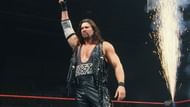#4 It ended the 'big man' era

In the 1980s and early 90s, WWE's chairman Vince McMahon was steadfast in his vision of wrest..err, sports entertainment...should be the land of larger-than-life characters, therefore it should come as no surprise that McMahon overwhelmingly favored physically tall, muscle-bound superstars regardless of their technical pro-wrestling skill (or lack thereof).
Hulk Hogan, Andre The Giant, The Ultimate Warrior, The Undertaker, Yokozuna and most other legends of the old days made the WWF look like a place where mostly the biggest, strongest athletes dominated.
Insane Vince McMahon ideas that got canceled - Watch Here!
With Diesel having held the WWF title for all of 1995 before Survivor Series, this era was swiftly about to come to a close.
The year of Nash's run happened to be one of the worst financial years in the company's history, and by the time of the fall, classic pay-per-view, it was clear that he had been the worst drawing champion of all time. That, coupled with McMahon's legal issues over alleged steroid distribution, led the company to pivot toward pushing smaller superstars like Hart and Shawn Michaels, who main evented the next Wrestle Mania.
By the time Diesel left WWF in the Spring of 1996, it was clear that the era of big men dominating the entire main event scene was over, and in the years since, the upper portion of the roster has been become much more diverse in size.
The departure of Nash and Scott Hall began the Monday Night wars and the WWE's main event contingent consisted of Triple H, Stone Cold and The Rock, all of whom were athletically good but medium in stature.
Make Sportskeeda your preferred choice for WWE content by clicking here: Source preferences

